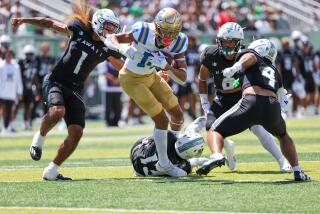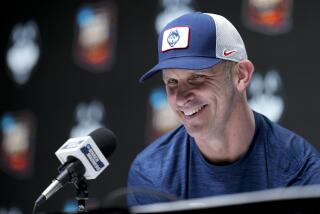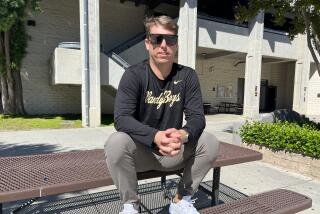Indoor Job in Limbo, Shaw Still Seeks a Football Home : Scrambling Once Again
- Share via
SAN DIEGO — Football has taken 41-year-old Dennis Shaw places, lots of places, none of them for very long.
As a player, as a coach, as a player-coach, Shaw has been to Buffalo and back. He played at three colleges and on five professional teams. He has coached at two universities, at one high school and in two professional leagues, both of which crumbled underneath him.
He played for six coaches in eight National Football League seasons and has been a coach in three corners of Illinois.
He once was traded from Buffalo to St. Louis for Ahmad Rashad and was reunited with Don Coryell, his former coach at San Diego State. “That was how much we thought of Dennis,” Coryell said. Two seasons later, Coryell told Shaw he no longer fit in his plans and sent him to the Giants, his next-to-last NFL team.
“Business is business,” Shaw says. His resume proves it.
Only one of Shaw’s 12 stops in college and professional football--as quarterback of the Buffalo Bills--has lasted more than two seasons. For Shaw, football has been a year here, a season or two there, a few months someplace else.
In between football assignments, he has sold insurance, teamed with his brother as a business consultant, supervised a carpet franchise operation and served as a radio color commentator on SDSU football games. These are among other jobs that have proved to be as temporary as his brief NFL fame.
His latest venture was as offensive coordinator of the San Diego Thunder, an entry in the fledgling World Indoor Football League. Of all Shaw’s jobs in football, this one might prove to be the briefest.
Less than three weeks after Shaw’s appointment was announced, and less than two weeks before the team was to play its first game, the league said it would delay its first season until 1989. The Thunder responded by releasing its coaching staff.
The team promises to return in April, but whether Shaw will be part of it has not been decided.
“It was a letdown, a real surprise,” Shaw said. “I gave up my job (with a carpet company) to work with this team. I figured to be employed a little longer.”
A succession of short stays is not the football career Shaw imagined when he finished his career at SDSU in 1969 and was selected by the Bills in the second round of the 1970 NFL draft. That was a time when his football future seemed boundless.
At SDSU, he was a centerpiece in the Aztecs’ golden era under Coryell. In just two seasons (Shaw was a community college transfer who had started his career as a linebacker at USC), he set school passing records that even Todd Santos never broke. Most notable are records for touchdown passes in a game (9) and touchdown passes in a season (39).
He arrived in Buffalo a year after O.J. Simpson, starting as a rookie in 1970 and throwing for a career-high 2,507 yards; he led the team in passing for three consecutive losing seasons under three coaches. In 1973, the team went 9-5 as Joe Ferguson took over. Shaw was traded to St. Louis in 1974, starting a career odyssey that as a player and coach has taken him to Illinois and back three times, to Chula Vista and several stops in between.
When Shaw discusses his nearly 20 years in and out of football since he left Montezuma Mesa, there are traces of bitterness. About lost playing chances. About the old-boy network in coaching. About feelings of estrangement from SDSU. About jobs gone bad and jobs never offered.
Questions on these topics frequently yield a fading, clipped answer from Shaw, a cue that the subject is best left unexplored. Only hints of his true feelings break through. He recalls an exhibition game when he was a player-coach with the Chicago Blitz of the defunct United States Football League. Shaw recounted the story as if he were holding on to a last bit of faded glory, a message to those who years before doubted his potential as an NFL quarterback.
“There was never a point when I couldn’t throw the ball,” he said. “When I threw those two touchdown passes against the (Michigan) Panthers, I was 38 years old. I knew coaching was what I wanted to do, but I could still go out there and play a quarter. I could still do it.”
But, as has been his luck, the Blitz and USFL folded. Another job turned to fool’s gold. Still, Shaw keeps searching.
“Football is fun,” he said. “It keeps me young and a little bit in shape. I don’t want to give it up.”
Shaw had hoped he had found what he was looking for with the Thunder. He had been recommended for the job by Coryell, a team consultant. In his brief tenure, Shaw showed a valued ability to find the kind of players the Thunder wanted while building a team with a limited payroll, centered on San Diego-area players.
“He was very instrumental in helping us put together our team,” said Don Matthews, who was hired to coach the Thunder. “Like, he’d say, ‘Hey, I know him’ or ‘I can call him’ or ‘I can do this.’ ”
The job was perfect for Shaw because, unlike many of his other football jobs, this would not force him to leave his wife, Elizabeth, and their four children behind in their Rancho Penasquitos home.
Keeping his family in the area has been important because of the security provided by his wife’s job as a teacher at Helix High School. Her work has given the family the steady income that has allowed Shaw to pursue his interest in coaching.
Shaw had tried working apart from them before, but it never felt right. Three times he set off for assistant coaching jobs in Illinois--at Eastern Illinois in 1980, at Western Illinois in 1983 and with the Blitz in 1984--only to find that he missed his family.
“I couldn’t take it,” he said. “I was always on the phone looking for the job back home. I was trying, but it never happened.”
The closest he came was when he filled in for one season at Chula Vista High School in 1981, leading the team to its first CIF playoff appearance in 17 years. Although he enjoyed working with the players and seeing their success, the grind of high school coaching has never appealed to him. Neither did the complications of college coaching.
“You have to do recruitment, promotions, community relations, the whole game plan,” Shaw said. “It is like being a father for 90 players for five years at each level. It’s a time-consuming process.”
That is one reason pro coaching has always held Shaw’s interest. To him, it is coaching at its purest level.
“If a player doesn’t produce, you replace him,” he said. “It’s a business, and you have a little bit more control over who you have on your team.”
But finding a job and staying in the pros is difficult. Buffalo’s Marv Levy was Shaw’s coach at his last NFL stop in Kansas City in 1978 and gave him his only other pro coaching job, with the Blitz, but he has had no room for Shaw with the Bills.
“It’s tough to find a job. More power to him,” Levy said. “To move into the professional level is not easy to do. For every coaching job, I get 100 guys, and 40 are real qualified.”
Coryell figures that if Shaw could have hung on to some of his college jobs longer, he might have had some more success.
“If he could have stayed in Illinois and lived permanently and coached college ball for a while, things might have been different,” Coryell said. “But family ties are more important to him. Hopefully this league will come back, because it will be a real shame for Dennis if it doesn’t.”
This latest disappointment with the Thunder has not changed Shaw’s goal. He wants to be a pro coach, but he has tempered his outlook slightly.
“That is still my direction (to coach in the pros), but it really doesn’t matter what level it is,” Shaw said. “My family is here. My roots are here. I don’t want to go elsewhere.”
His interest in remaining in the area has led Shaw on several occasions to pursue employment opportunities at SDSU. He applied for the head coaching position after Claude Gilbert was fired in 1980 and has pursued administrative openings in the past. But the closest he has come to a job with the university was when he worked on KSDO broadcasts of Aztec football games in 1986.
That, too, ended abruptly after one season when the station lost its SDSU broadcast rights to KFMB.
The experience of each successive football failure does little to prepare Shaw for the next. Each comes with its own little shock, its own little disappointment. When the Thunder was put on hold for a year, Shaw was left to hope that he would be rehired and wondering what to do now.
All he knows is that he does not want to go back to his job with the carpet company and its accompanying daily commute to Los Angeles. Chances are, Shaw said, he might have to return to the business world--what he calls the “private sector”--until another coaching opportunity comes along.
“I just have to knock on the right door at the right time,” he said. “I just need to find someone who likes me for myself.”
More to Read
Go beyond the scoreboard
Get the latest on L.A.'s teams in the daily Sports Report newsletter.
You may occasionally receive promotional content from the Los Angeles Times.










